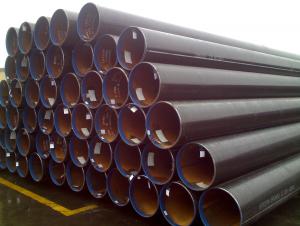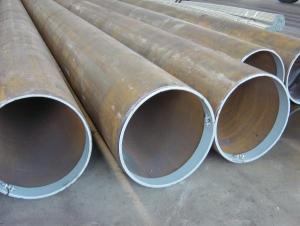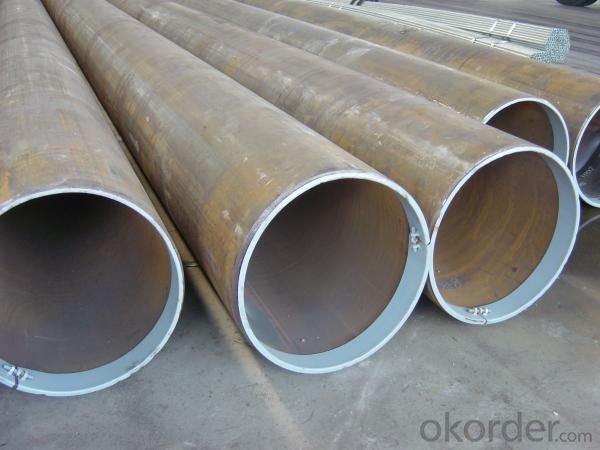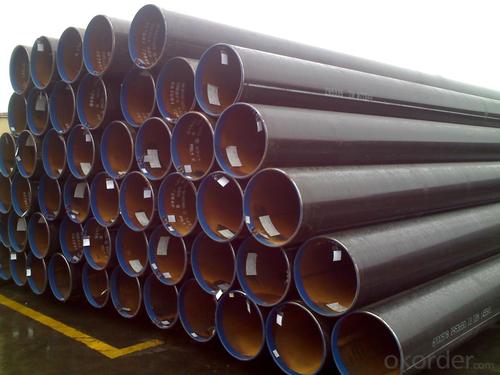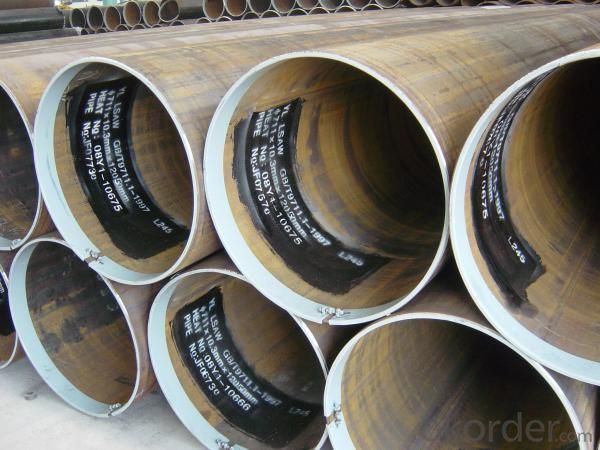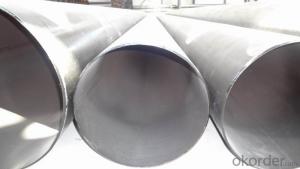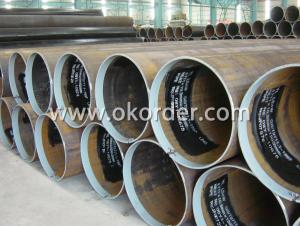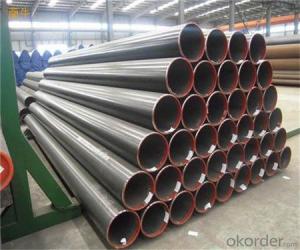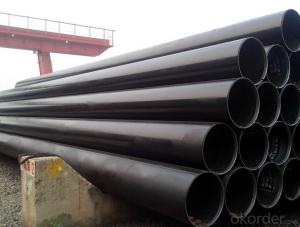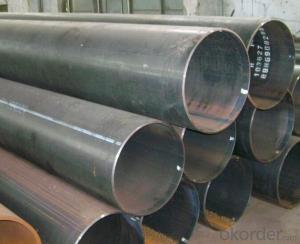LSAW Welded Steel Pipes API SPEC 5L Gr.B X40 X42 X52 X56 X60 X65 X70
- Loading Port:
- Shanghai Port
- Payment Terms:
- TT or L/C
- Min Order Qty:
- 50MT m.t.
- Supply Capability:
- based on order m.t./month
OKorder Service Pledge
OKorder Financial Service
You Might Also Like
1.Specification of LSAW Welded Steel Pipes API SPEC 5L Gr.B X40 X42 X52 X56 X60 X65 X70
1)Application: It is widely applied to line pipe in oil and sewage transportation , and it is used in Low pressure liquid and gassy transportation and it is also good Structure pipe in building and bridge field.
2)Standard: API SPEC 5L
3)Grade:API 5L GR.B, X40, X42, X52, X56, X60, X65, X70
4)Surface: Bare / Varnish coating / FBE, 3PE coating DIN30670 / or by client option
2.Size of Pipes
OD: 406.4MM-1422MM (16”-56”)
Thickness: 8MM-50.8MM depends on OD
3.Packing & Delivery
Package Detail: bundles with anti-rust painting and with plastic caps
Delivery Term: 30 days after receving payment or L/C
4. Data Sheet
Mechanical Properties
Standard | Grade | (MPa) | (MPa) | ||
Yield strength | Tensile Strength | ||||
API SPEC 5L | PSL1 | ||||
B | ≥241 | ≥414 | |||
×42 | ≥290 | ≥414 | |||
×46 | ≥317 | ≥434 | |||
×52 | ≥359 | ≥455 | |||
×56 | ≥386 | ≥490 | |||
×60 | ≥414 | ≥517 | |||
×65 | ≥448 | ≥531 | |||
×70 | ≥483 | ≥565 | |||
PSL2 | |||||
| Min | Max | Min | Max | |
B | 241 | 448 | 441 | 758 | |
×42 | 290 | 496 | 414 | 758 | |
×46 | 317 | 524 | 434 | 758 | |
×52 | 359 | 531 | 455 | 758 | |
×56 | 386 | 544 | 490 | 758 | |
×60 | 414 | 565 | 517 | 758 | |
×65 | 448 | 600 | 531 | 758 | |
×70 | 483 | 621 | 565 | 758 | |
Chemical Composition(%)
Standard | Grade | C | Mn | P | S | CEV |
Max | Max | Max | Max | Max | ||
PSL1 |
- | |||||
B | 0.26 | 1.2 | 0.030 | 0.030 | ||
×42 | 0.26 | 1.3 | 0.030 | 0.030 | ||
×46,×52,×56,X60 | 0.26 | 1.4 | 0.030 | 0.030 | ||
X65 | 0.26 | 1.45 | 0.030 | 0.030 | ||
X70 | 0.26 | 1.65 | 0.030 | 0.030 | ||
PSL2 |
0.43 | |||||
B | 0.22 | 1.20 | 0.025 | 0.015 | ||
×42 | 0.22 | 1.30 | 0.025 | 0.015 | ||
×46,×52,×56, X60 | 0.22 | 1.40 | 0.025 | 0.015 | ||
X65 | 0.22 | 1.45 | 0.025 | 0.015 | ||
X70 | 0.22 | 1.65 | 0.025 | 0.015 | ||
5. Products Showroom
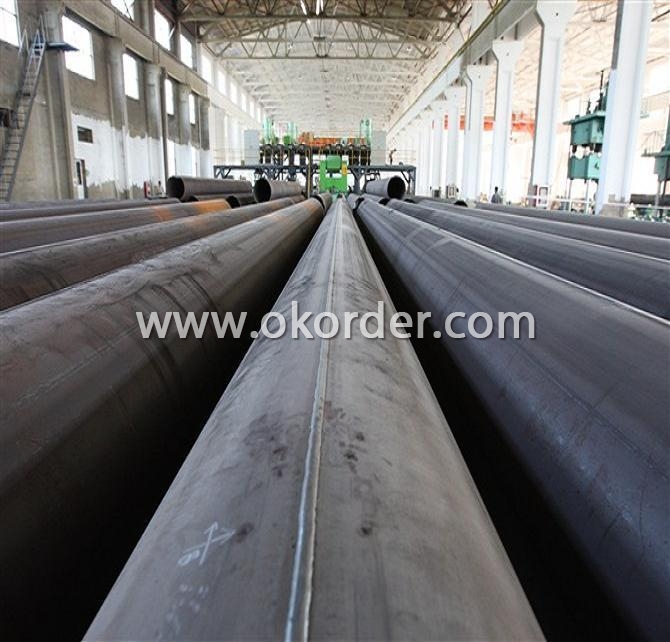
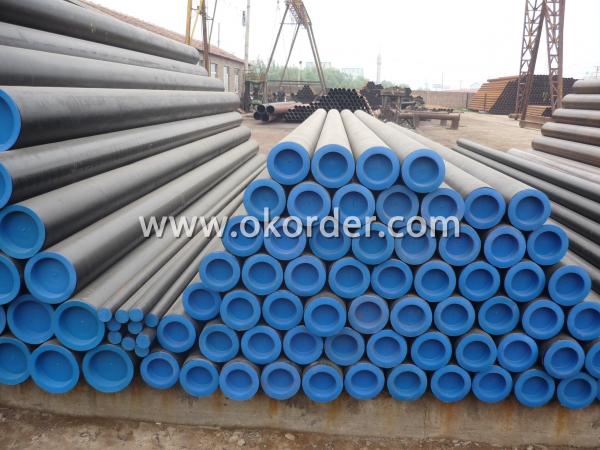
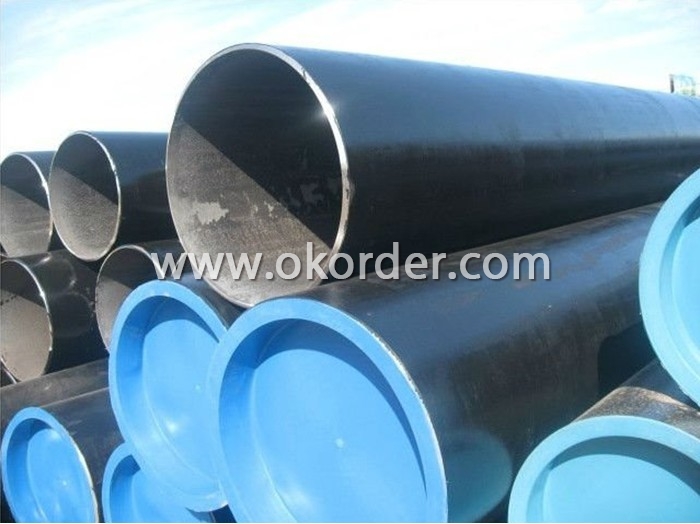
- Q: How can the immersed pipe pile put steel cage into the steel pipe? Which expert to answer?
- Pile: refers to the use of hammer piling method and pile vibration method, steel casing with valve type pile tip or precast reinforced concrete pile boots into the soil, then pouring concrete (or first in the tube into the cage), while hammering or vibration of a pile side pull tube. The former is called hammer sinking pipe cast-in-place pile, and the latter is called vibrating sinking pipe cast-in-place pile.
- Q: Can steel pipes be used for airport construction?
- Yes, steel pipes can be used for airport construction. Steel pipes are commonly used in various applications in the construction industry, including airports. They are often used for underground utilities such as water and sewage lines, as well as for structural purposes such as supporting the airport terminal building. Steel pipes offer several advantages for airport construction. Firstly, they have high strength and durability, making them suitable for handling heavy loads and withstanding adverse weather conditions. This is important for ensuring the safety and stability of airport structures. Secondly, steel pipes are versatile and can be easily customized to fit specific project requirements. They come in various sizes and thicknesses, allowing for flexibility in design and construction. Additionally, steel pipes can be welded or joined together to create longer sections, which simplifies installation and reduces construction time. Moreover, steel pipes are resistant to corrosion, which is crucial in airports where there is constant exposure to moisture, salt, and other environmental factors. Their resistance to corrosion ensures the longevity and reliability of the infrastructure. Lastly, steel pipes are cost-effective compared to other materials such as concrete or PVC. They have a relatively low maintenance requirement and a long lifespan, reducing the need for frequent repairs or replacements, thus saving time and money in the long run. In conclusion, steel pipes are a suitable choice for airport construction due to their strength, durability, versatility, corrosion resistance, and cost-effectiveness.
- Q: How do steel pipes compare to other materials in terms of cost?
- Steel pipes are generally more cost-effective compared to other materials due to their durability and longevity. While the initial investment may be higher, their lower maintenance and replacement costs make them a more economical choice in the long run. Additionally, steel pipes can withstand harsh environmental conditions and are less prone to corrosion, reducing the need for frequent repairs or replacements.
- Q: What are the safety precautions while working with steel pipes?
- Some safety precautions while working with steel pipes include wearing appropriate personal protective equipment such as gloves, safety glasses, and steel-toed boots to prevent injuries. It is important to ensure the work area is clear of any obstacles or tripping hazards. Workers should be trained in proper lifting techniques to prevent strain or back injuries. Additionally, it is crucial to follow proper procedures for handling and storing steel pipes to prevent accidents and maintain a safe working environment.
- Q: What are the factors to consider when selecting steel pipes for a specific application?
- When selecting steel pipes for a specific application, several factors need to be considered. The key factors include the required strength and durability, corrosion resistance, temperature and pressure requirements, size and dimensions, cost considerations, and compatibility with other materials or systems. Additionally, factors such as the intended environment, installation requirements, and regulatory compliance should also be taken into account to ensure the optimal selection of steel pipes for the particular application.
- Q: Can steel pipes be used for hydraulic systems?
- Yes, steel pipes can be used for hydraulic systems. Steel pipes are commonly used in hydraulic systems due to their high strength, durability, and resistance to high pressure and temperature. They provide reliable performance and are suitable for a wide range of hydraulic applications.
- Q: Can steel pipes be used for firefighting systems?
- Indeed, firefighting systems can utilize steel pipes. Steel pipes are frequently chosen for their robustness and ability to endure high temperatures, making them ideal for transporting water and other fire-suppressing agents. Typically, these pipes are employed in larger commercial or industrial structures that necessitate a larger flow rate and pressure for their fire protection systems. Additionally, steel pipes possess the benefit of withstanding external forces and impacts, thus ensuring the integrity of the firefighting system. Moreover, steel pipes offer the convenience of easy connection, simplifying installation and maintenance procedures. Nonetheless, it is crucial to ensure that the steel pipes employed in firefighting systems undergo appropriate treatment to prevent corrosion and rusting, as these factors may compromise their effectiveness during emergency situations. Regular inspections and maintenance are necessary to guarantee the reliability and functionality of the steel pipes within the firefighting system.
- Q: What are the different types of corrosion that can affect steel pipes?
- There are several types of corrosion that can affect steel pipes, including general or uniform corrosion, pitting corrosion, galvanic corrosion, crevice corrosion, and stress corrosion cracking.
- Q: What are the environmental impacts of steel pipe production and disposal?
- The environmental impacts of steel pipe production and disposal are mainly related to the extraction and processing of raw materials, energy consumption, greenhouse gas emissions, and waste generation. The production of steel pipes requires the extraction of iron ore and other raw materials, which can lead to habitat destruction and biodiversity loss. The processing and manufacturing of steel pipes also involve significant energy consumption, contributing to carbon dioxide emissions and climate change. Additionally, the disposal of steel pipes, especially if not properly managed, can result in waste accumulation and potential soil and water pollution. Therefore, it is crucial to consider sustainable practices and recycling options to minimize the environmental impacts associated with steel pipe production and disposal.
- Q: What are the different types of steel pipe coatings for corrosive environments?
- There are several types of steel pipe coatings specifically designed for corrosive environments. Some common options include fusion-bonded epoxy (FBE) coatings, liquid epoxy coatings, polyethylene (PE) coatings, and polyurethane (PU) coatings. These coatings provide a protective layer to prevent corrosion and extend the lifespan of the steel pipes in various corrosive conditions.
1. Manufacturer Overview
| Location | Wuxi, China |
| Year Established | 1980 |
| Annual Output Value | Above Three Million To Five Million RMB |
| Main Markets | Main land |
| Company Certifications | Certificate of Conformity; API 5CT |
2. Manufacturer Certificates
| a) Certification Name | |
| Range | |
| Reference | |
| Validity Period |
3. Manufacturer Capability
| a) Trade Capacity | |
| Nearest Port | Shanghai |
| Export Percentage | 30%-40% |
| No.of Employees in Trade Department | 1400 People |
| Language Spoken: | English; Chinese |
| b) Factory Information | |
| Factory Size: | 1500 square meters |
| No. of Production Lines | Above 14 |
| Contract Manufacturing | CNPC;Sinopec Group |
| Product Price Range | Average |
Send your message to us
LSAW Welded Steel Pipes API SPEC 5L Gr.B X40 X42 X52 X56 X60 X65 X70
- Loading Port:
- Shanghai Port
- Payment Terms:
- TT or L/C
- Min Order Qty:
- 50MT m.t.
- Supply Capability:
- based on order m.t./month
OKorder Service Pledge
OKorder Financial Service
Similar products
Hot products
Hot Searches
Related keywords
